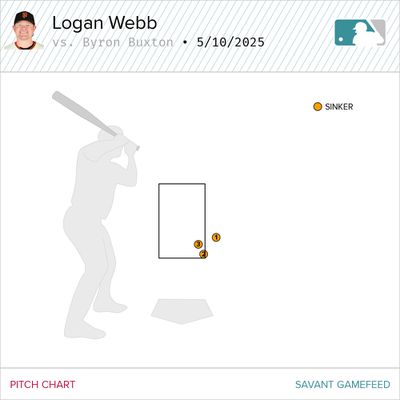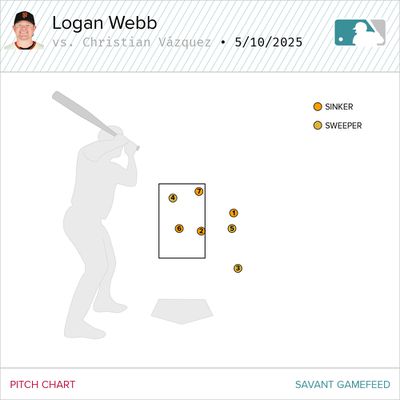
Day 2
Standing on third base as the tying run with an out in the 8th, Heliot Ramos appeared primed to single-handedly pull the San Francisco Giants out of the mire.
After another day with an absent offense, Ramos was responsible for all three of the team’s hits on the day. His 2nd inning solo shot off Joe Ryan was San Francisco’s lone run of the game so far, and what felt like the only ball in play not popped up to an infielder.
His lead-off double high off the right-center wall set up San Francisco’s first at-bat with a runner in scoring position 17 innings into the series, and just the second time they had the lead-off runner on base (ironically, also Heliot Ramos and also in the 8th inning).
In theory, mere outs were needed to tie the game up — and outs were a specialty of the San Francisco offense since touching down in Minnesota. LaMonte Wade Jr. did his part with a line drive fly out to deep center to advance Ramos, and that odd, foreign sense of possibility bloomed. Options, scoring options, presented themselves as Patrick Bailey stepped into the box and the Twins infield tightened on to the grass.
A sacrifice fly, a safety squeeze, softly hit dribbler, a grounder forcing an infielder to their backhand or into a dive — at the time, fans didn’t even dare consider the possibility of a hit. Two in one inning? Was that even allowed? The most elastic and generative our imaginations could be after sitting through the mind-numbing performance over the last two nights was a productive out.
Even that proved too much to ask.
One watches that play over and over again and wonder how something like that could happen. A stupid back-pick? Really? Those never work! How could the most precious and rare commodity to the Giants in that moment — a baserunner — be treated so flippantly?
But maybe flippant isn’t exactly fair. Certainly in the heat of the moment, I reacted as if this was an egregious error, bordering on the immoral. But after zipping through all the stages of grief in the aftermath, it’s clear Ramos wasn’t necessarily playing fast-and-loose, he was more a victim of the situation. Ramos had to be aggressive, had to be singularly focused on squeezing every possible advantage out of the limited resource available to him. Any ball in play, he was going. The moment of contact, he was breaking for the plate. If not him, then who? If not then, then when? Desperation is the result of scarcity. His large secondary lead reflected that back-against-the-wall need, and the Twins capitalized on it with a well-executed pick-off play.
Heliot Ramos on getting picked off at third by in the eighth inning of the Giants’ 2-1 loss: “I was just focused on trying to go on contact and try to score the run. At the end of the day, that’s the play of the game. I do feel bad about it. It was because of me that we lost that game.”
— Maria I. Guardado (@miguardado.bsky.social) 2025-05-11T02:15:24.718Z
So Ramos’s culpability is up for debate. He’s right in the sense that pick-off was the bale of hay that broke the camel’s back — but it wasn’t his fault that the Giants lost. That distinction clearly lies with the eight other batters in the line-up. And really, Christian Koss gets a pass as well. The number 9 hitter broke up Paddack’s perfect game yesterday, he smoked a ball 400 feet to center that left his bat at 105 MPH and would’ve been over the fence in 5 MLB parks (including Oracle), and promptly put the tying run back on base with a lead-off bunt single in the 9th — before Mike Yastrzemski grounded into a real-bummer of a double play.
In fact, Ramos and Koss have 6 of San Francisco’s 7 hits so far in this series— while the rest of the line-up has gone just 1 for 47. I’m no doctor, but this feels like an easy diagnosis — that kind of collective showing at the plate won’t win you many baseball games.
Yup, day two of the drought. Another dour display of impotence from the San Francisco offense. Nearly the victims of perfection on Friday against Chris Paddack, the order of events were shaken-up slightly against Joe Ryan on Saturday, but the results were the same.
This wasn’t totally unexpected after Friday, and even before Paddack’s 4-seam heavy night, the Giants had made it very clear that they do not hit well against the pitch-type. Their -1.18 4-Seam Runs Above Average is the lowest mark in Majors. Taking that base and adding Joe Ryan’s 4-seamer Run Value of 6 (the 8th highest mark in the Majors) and the fact that he throws the pitch 57% of the time (the 4th most in the Majors), and you got a real crappy stew going.
Knowing all this, I was still baffled by what I saw. And I know I’m sitting on my couch a thousand miles away with zero experience of hitting a 90 MPH fastball, but watching Ryan pitch today, I just couldn’t wrap my head around what was causing all the fuss.
I think Ryan would be the first to admit that he was not sharp at all. At times, he looked visibly ill, physically winded and still recovering from a sickness earlier in the week. His average velocity — already not high to begin with — was a tick down, nor did I think his command was anything to write home about. What typically makes the Ryan 4-seam tricky is his low release point and the subsequent lateral run the ball gets from his arm angle. That characteristic was on display this afternoon, and some offerings certainly went on some runs, but on average, the horizontal break was also down.
An off day for Ryan, and still the Giants took their 4-seam ineptness to another level. At-bat after at-bat, heart-of-the-zone heaters weren’t even offered at, or blew past barrels, or produced lazy pop-ups. And it wasn’t like they didn’t know it was coming. Ryan is known as the 4-Seam Guy, and on Saturday, he even outdid himself, relying on the pitch 72% of the time. Yet there were still moments when hitters seemed caught off-guard by the pitch, like they were expecting something else for some reason, sitting on a breaking ball and got jumped by the 4-seam.
If I’m being honest (and a little dramatic), watching this poor display felt personal. Their hacks and poor contact were all done on purpose, to hurt me, to drive me crazy. It felt like same thing happened over and over again, as if I was trapped on a creepy carnival carousel surrounded by a house of mirrors. Or maybe I was the subject of a Truman Show crossover with MTV, and I was in the midst of being elaborately punked. When Willy Adames popped up in foul territory to end the 6th for what felt like the hundredth time I braced for, and even hoped for, Ashton Kutcher to crash into my apartment and stick his finger in my face and cackle — at least then I’d have an explanation.
So yeah, this game was a bust. Obviously I handled it poorly. I took it personally— now imagine how Logan Webb feels. San Francisco’s ace earned his sixth quality start in his ninth outing, allowing 2 runs over 7 innings while striking out 10, and he got stuck with a thank-less loss.
So let’s not take any more away from Webb and end this night singing his praises. His sinker was so good it caused Twins manager Rocco Baldelli to short circuit in the 6th. He had spent the afternoon dotting the pitch on the outside corner. Right-handed hitters were tourists in the box against the pitch. All they could do is watch it go by. They could do nothing with the sinker’s backdoor movement, it’s late break to scrape the distant edge of the zone. In the 5th, the red-hot Byron Buxton watched three straight go by without moving the bat from his shoulder, good for his third strike-out of the day.

Webb had been so consistent with his command, the zone inevitably expanded and took on a bit of a live edge. A 2-1 sink to Carlos Correa certainly pushed the idea of what a strike could be, and when home plate umpire Adrian Johnson saw it in the zone, Baldelli had a fit. What’s funny about the Baldelli outburst is that Webb establishing the bottom of the zone may have contributed to his only walk of the day — a walk that proved the difference in the 2-1 loss.
The 3-2 sinker to back-up catcher Christian Vázquez appeared to have clipped the top of the zone in the 3rd inning, but Webb, who makes his living down at the knees, didn’t get the call.

A free base-runner to the number 9 hitter in the order set-up Trevor Larnach’s blast a batter later. A first-pitch sweeper that the lefty hooked over the right field wall proved to be the ball game. It was only the second homer Webb had allowed all season and the first since his start in Houston over a month ago.
With the lead lost, Webb still continued to cruise. In total, he induced 10 of the 12 outs on balls in play were hit on the ground, and he earned 28 called strikes with 18 coming from the sinker. Unfortunately the one that got away proved costly.